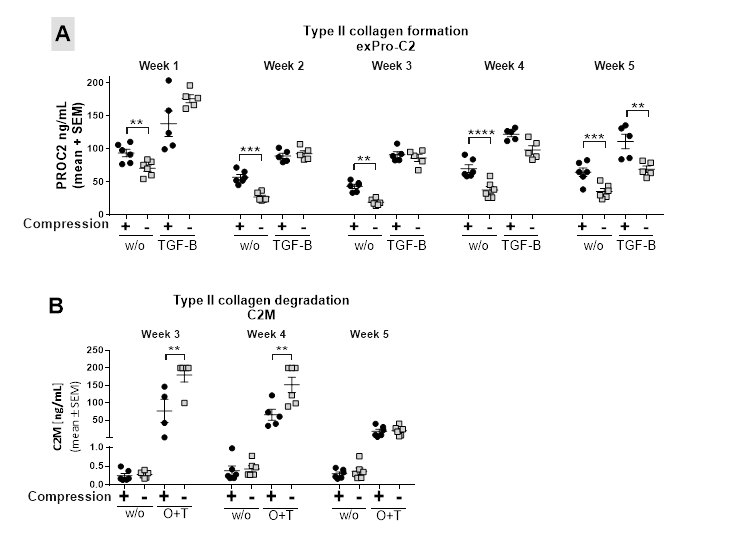Session Information
Session Type: ACR Poster Session C
Session Time: 9:00AM-11:00AM
Background/Purpose: Mechanical loading is recognized as a major factor in initiation and progression of osteoarthritis (OA). Conversely loading is believed to play an essential role in maintaining homeostasis of healthy cartilage. Given the biomechanical function of articular cartilage and the mechanosensitivity of chondrocytes, physiological loading may be of importance in a translational cartilage model and hereby, in development of new OA drug candidates. This study investigated the effect of long-term dynamic ex vivo compression on articular cartilage through quantification of type II collagen formation and degradation.
Methods: Full-depth bovine cartilage explants were cultured for 5 weeks. The explants were treated 3 times a week with either OSM [10 ng/mL] and TNF-a [2 ng/mL] (O+T), or TGF-β1 [50 ng/mL]. Untreated samples were included as negative controls (w/o). For each condition, two groups were established; an unloaded group and a group compressed 3 times a week. Compression was applied using Electroforce 5500® (TA Instruments), in a sine wave with a maximum load per cycle of 1 MPa, at 1 Hz frequency for 1200 cycles. Metabolic activity was measured once a week using AlamarBlue. Biomarkers released to the supernatant were assessed using ELISAs: Pro-C2 and C2M for measurement of type II collagen formation and degradation respectively.
To cite this abstract in AMA style:
Engstrøm A, Bay-Jensen AC, Karsdal MA, Thudium CS. Dynamic Compression of Articular Cartilage Explants Increases Formation and Decreases Degradation of Type II Collagen [abstract]. Arthritis Rheumatol. 2018; 70 (suppl 9). https://acrabstracts.org/abstract/dynamic-compression-of-articular-cartilage-explants-increases-formation-and-decreases-degradation-of-type-ii-collagen/. Accessed .« Back to 2018 ACR/ARHP Annual Meeting
ACR Meeting Abstracts - https://acrabstracts.org/abstract/dynamic-compression-of-articular-cartilage-explants-increases-formation-and-decreases-degradation-of-type-ii-collagen/

